SWEDISH
SOUTH ASIAN STUDIES NETWORK
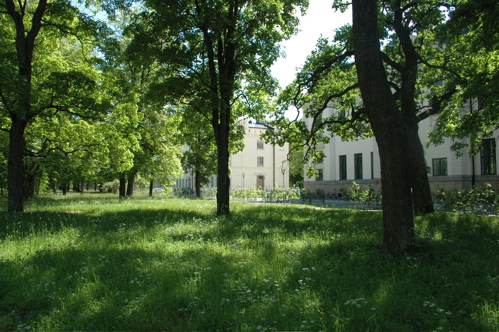 Newsletter
53:
Newsletter
53:
30 June 2005
| SASNET News | |
| Cultural activities | New and updated information to the web site |
SASNET News:
• 29
applications received for the First Round of SASNET Planning
Grants 2005
 Last
date for applications was 15 June 2005. Out of the 29 applications 20
refer to networking for new research programmes/projects, two to continued
networking for research programmes/projects, six to networking for new
education programmes/projects, and one to continued networking for an
education project. Total amount applied for is 2.68 Million SEK, whereas
the amount available to distribute is approximately 475.000 SEK. Decisions
will be taken on 30 August 2005. More information.
Last
date for applications was 15 June 2005. Out of the 29 applications 20
refer to networking for new research programmes/projects, two to continued
networking for research programmes/projects, six to networking for new
education programmes/projects, and one to continued networking for an
education project. Total amount applied for is 2.68 Million SEK, whereas
the amount available to distribute is approximately 475.000 SEK. Decisions
will be taken on 30 August 2005. More information.
• Applications for the next round of SASNET
planning grants
are now invited. Closing date for applications is 15 November, 2005. More
information.
• External evaluation of SASNET completed
The three external evaluators who have have scrutinized the activities
of SASNET presented their final report to Sida/SAREC and Lund University
on Thursday 30 June 2005. The evaluation group has consisted of Prof.
Ghanshyam Shah, Political Scientist from Ahmedabad, India; Prof. Carla
Risseeuw, Dept. of Anthropology and Development Sociology, University
of Leiden, The Netherlands; and Mr. Lennart Wohlgemut, Director of the
Nordic Africa Institute in Uppsala (team leader). The report will
be the basis for SASNET’s application for renewed funding from Sida/SAREC
and Lund University for the period 2006–2008.
• SASNET contact journeys within Sweden
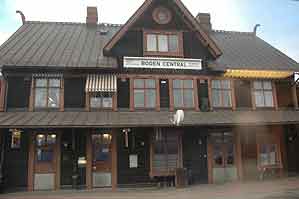 SASNET’s
webmaster Lars Eklund has started to regularly visit departments and researchers/educationists
involved in South Asia related research at Swedish universities. It is
part of an effort to strenghten the SASNET national network. In November
2004 he visited Örebro University in connection with the 10th Anniversary
celebration of the Sweden–India Project, run by the Social
Work programme, but also visited the Department
of Caring Sciences. In December 2004 Lars went to Luleå University
of Technology, where he visited the Department of
Economics and the Divisions of Industrial
Design, Mineral Processing, and Operation
and Maintenance Engineering. Earlier during 2004 Lars Eklund also
visited the University of Dalarna, Campus Falun, and Göteborg University.
SASNET’s
webmaster Lars Eklund has started to regularly visit departments and researchers/educationists
involved in South Asia related research at Swedish universities. It is
part of an effort to strenghten the SASNET national network. In November
2004 he visited Örebro University in connection with the 10th Anniversary
celebration of the Sweden–India Project, run by the Social
Work programme, but also visited the Department
of Caring Sciences. In December 2004 Lars went to Luleå University
of Technology, where he visited the Department of
Economics and the Divisions of Industrial
Design, Mineral Processing, and Operation
and Maintenance Engineering. Earlier during 2004 Lars Eklund also
visited the University of Dalarna, Campus Falun, and Göteborg University.
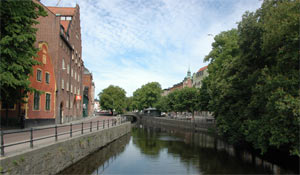 On
20 June 2005 Lars visited Uppsala University, where he met with researchers
at the Department of Linguistics and Philology (in the South
Asian Languages and Culture division, the Iranian
languages division, and the Linguistics and
Computer Lingustics division); at the Department
of Cultural Anthropology and Ethnology; and finally at the International
Maternal and Child Health (IMCH) division of the Dept. of Women's
and Children's Health.
On
20 June 2005 Lars visited Uppsala University, where he met with researchers
at the Department of Linguistics and Philology (in the South
Asian Languages and Culture division, the Iranian
languages division, and the Linguistics and
Computer Lingustics division); at the Department
of Cultural Anthropology and Ethnology; and finally at the International
Maternal and Child Health (IMCH) division of the Dept. of Women's
and Children's Health.
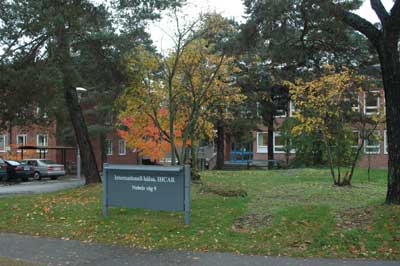 The
following day he proceeded to Karolinska Institutet Medical University
in Stockholm and met with researchers at the Division
of International Health (IHCAR), the Center
of Molecular Medicine; the Paediatric Endocrinology
Unit of the Dept. of Woman and Child Health, and other departments
involved in South Asia related research and education. He also attended
the meeting of Karolinska Institutet Research and Training Committee,
KIRT, when it decided to intensify and extend the already existing collaboration
on research and research training with Pakistan (more
information).
The
following day he proceeded to Karolinska Institutet Medical University
in Stockholm and met with researchers at the Division
of International Health (IHCAR), the Center
of Molecular Medicine; the Paediatric Endocrinology
Unit of the Dept. of Woman and Child Health, and other departments
involved in South Asia related research and education. He also attended
the meeting of Karolinska Institutet Research and Training Committee,
KIRT, when it decided to intensify and extend the already existing collaboration
on research and research training with Pakistan (more
information).
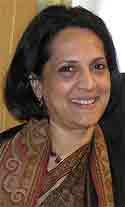 |
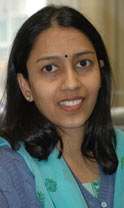 |
| Ms. Deepa Gopalan Wadhwa and Ms. Vani Rao | |
• Indian Ambassador visited
SASNET and Lund University
The Indian Ambassador to Sweden, Ms. Deepa Gopalan Wadhwa, along with
the First Secretary of the Embassy, Ms. Vani Rao, visited Lund University
on Monday 13 June 2005.
The programme for the day, prepared by SASNET, included visits to the
Dept. of Biotechnology where they were welcomed
by Prof. Rajni Hatti-Kaul, and the Section for
Indic Religions at the Centre for Theology and Religious Studies where
they were welcomed by Prof. Olle Qvarnström. At both places meetings
were arranged with a large number of South Asia related researchers at
Lund University. The Ambassador also had meetings with the Vice-Chancellor
Prof. Göran Bexell, Assistant Vice-chancellor Björn Wittenmark,
Deputy Head of the International Office, Ms. Boel Billgren, as well as
with the SASNET root node staff. More information
on the visit.
• Karolinska Institutet increases its collaboration
on research training with Pakistan
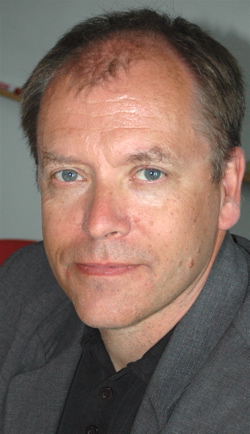 Karolinska
Institutet Research and Training Committee, KIRT, has decided to intensify
and extend the already existing collaboration on research and research
training with Pakistan, mainly through the Aga Khan University (AKU) in
Karachi. A meeting was held at the Department of Public Health Sciences/Division
of International Health (IHCAR) on 21 June 2005, to discuss a suggestion
by Professor Jan Carlstedt Duke, Dean of Research at KI, on increased
collaboration with Pakistan. The meeting, led by the chairman of KIRT,
Prof. Vinod Diwan, was attended by a large number of KI researchers already
involved in such projects, and also by Lars Eklund from SASNET. Details
were discussed on how the project will be best pursued, based on the MoU
signed in 2001 between KI and AKU. Prof. Olle Söder from KI’s
Paediatric Endocrinology Unit (photo
to the right) was appointed scientific coordinator to develop the
Pakistan project. Read more about the 50 years
of collaboration between Karolinska Institutet Medical University and
Pakistan in a report by Prof. Emeritus Bo Lindblad.
Karolinska
Institutet Research and Training Committee, KIRT, has decided to intensify
and extend the already existing collaboration on research and research
training with Pakistan, mainly through the Aga Khan University (AKU) in
Karachi. A meeting was held at the Department of Public Health Sciences/Division
of International Health (IHCAR) on 21 June 2005, to discuss a suggestion
by Professor Jan Carlstedt Duke, Dean of Research at KI, on increased
collaboration with Pakistan. The meeting, led by the chairman of KIRT,
Prof. Vinod Diwan, was attended by a large number of KI researchers already
involved in such projects, and also by Lars Eklund from SASNET. Details
were discussed on how the project will be best pursued, based on the MoU
signed in 2001 between KI and AKU. Prof. Olle Söder from KI’s
Paediatric Endocrinology Unit (photo
to the right) was appointed scientific coordinator to develop the
Pakistan project. Read more about the 50 years
of collaboration between Karolinska Institutet Medical University and
Pakistan in a report by Prof. Emeritus Bo Lindblad.
• KTH delegation visited Pakistani universities
to discuss collaboration projects
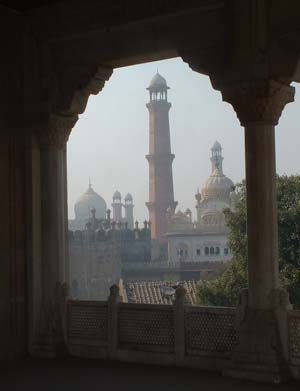 A
delegation from the Royal Institute of Technology (KTH) in Stockholm recently
visited Pakistan to enhance increased co-operation between Swedish and
Pakistani universities and industry. The delegation included Ramon Wyss,
Vice Rector of KTH; Prosun Bhattacharya, Division
of Land and Water Resources; Olle Wahlberg, Inorganic
Chemistry, Dept. of Chemistry; Afzal Sher, SPIDER,
Swedish Program for ICT in Developing Regions; Gunnel Dalhammar, Applied
Environmental Microbiology, Dept. of Biotechnology; Leif Kari, Marcus
Wallenberg Laboratory for Sound and Vibration Research (MWL), Dept.
of Aeronautical and Vehicle Engineering; and Björn Pehrson, Telecommunication
Systems Laboratory (TSLab).
A
delegation from the Royal Institute of Technology (KTH) in Stockholm recently
visited Pakistan to enhance increased co-operation between Swedish and
Pakistani universities and industry. The delegation included Ramon Wyss,
Vice Rector of KTH; Prosun Bhattacharya, Division
of Land and Water Resources; Olle Wahlberg, Inorganic
Chemistry, Dept. of Chemistry; Afzal Sher, SPIDER,
Swedish Program for ICT in Developing Regions; Gunnel Dalhammar, Applied
Environmental Microbiology, Dept. of Biotechnology; Leif Kari, Marcus
Wallenberg Laboratory for Sound and Vibration Research (MWL), Dept.
of Aeronautical and Vehicle Engineering; and Björn Pehrson, Telecommunication
Systems Laboratory (TSLab).
In Islamabad they visited the Higher Education Commission (HEC), headed
by Dr Naqvi, and during five days they met representatives of Pakistani
universities and institutes in three cities; Karachi, Lahore and Islamabad.
Several future co-operation projects were discussed. These are intended
to take place on different levels: through exchange of students and teachers
by personal contacts; via co-operation between departments for research
and education; via co-operation between universities on a higher level
for exchanging experiences; and finally in planning for a completely new
technical university in Pakistan. HEC has already allocated budget funds
for the project to be launched during 2005, and decided that KTH will
be a partner institution. More information from Prof. Ramon Wyss, wyss@nuclear.kth.se.
• Arsenic poisoning in Bangladesh highlighted
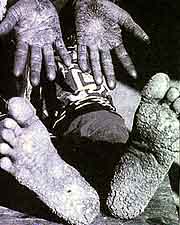 The
most extensive mass poisoning in the World presently takes place in Bangladesh.
At least 35 Million people drink arsenic contaminated water from wells,
dug at a large scale by Western development assistance organisations,
including the Swedish International Development Cooperation Agency, Sida,
since the 1970’s. This catastrophe has been highlighted in Swedish
media during the Spring 2005 after an investigative story by Karin Bojs
och Per Snaprud in Dagens Nyheter. Read
the articles, plus an article published by Sida, giving the background
to the ongoing catastrophe (in Swedish only).
The
most extensive mass poisoning in the World presently takes place in Bangladesh.
At least 35 Million people drink arsenic contaminated water from wells,
dug at a large scale by Western development assistance organisations,
including the Swedish International Development Cooperation Agency, Sida,
since the 1970’s. This catastrophe has been highlighted in Swedish
media during the Spring 2005 after an investigative story by Karin Bojs
och Per Snaprud in Dagens Nyheter. Read
the articles, plus an article published by Sida, giving the background
to the ongoing catastrophe (in Swedish only).
The School of Environmental Studies
at Jadavpur University, Kolkata, India, recently published a shocking
report on the issue, called ”Million Dollar Arsenic Projects in
Bangladesh: Arsenic Situation Deteriorated in Eruani Village of Laksham
P.S., Comilla District from 1997-2005”. Read
an abstract of the report (as a pdf-file). The full report can be
ordered from Dhaka Community Hospital (DCH) in Bangladesh, by mail: dch@bangla.net
• Swedish government chooses the Bologna
process
The Swedish government on 14 June 2005 presented its draft for a new
bill regarding the internationalisation of higher education in Sweden.
The structure of educational programmes and degrees will change, and a
new two-year Master’s Degree will be introduced. The present Degree
of Master (magisterexamen) will however also be retained. Higher education
credits, but not grades, will be brought into line with the European model
(ECTS), according to the Bologna process, meant to create a common higher
education area by harmonising academic degree standards and quality assurance
standards throughout Europe. More
information on the draft bill.
• Research proposals on water
Invited from young scientists in developing countries
The International Foundation for Science (IFS) and the CGIAR Challenge
Program on Water & Food (CPWF) has issued a call for research proposals
open to young scientists in developing countries focusing on at least
one of five areas: • Crop Water Productivity Improvement Water and
People in Catchments; • Aquatic Ecosystems and Fisheries; •
Integrated Basin Water Management Systems; or • The Global and National
Food and Water System. The river basins include the Indo-Gangetic basin.
Researchers in developing countries who satisfy the IFS eligibility criteria
(below) and who are doing research in the above mentioned areas. Deadline
for applications: 30 June 2005.
• Kiran Mazumdar-Shaw visited Karolinska
Institutet Medical University
 Dr. Kiran Mazumdar-Shaw,
Chairman and Managing Director of Biocon (India) visited Karolinska Institutet
Medical University in Stockholm on the invitation of Dr. C.B. Sanjeevi
26–27 May 2005. The visit involved meeting with President of KI,
Prof. Harriet Wallberg Henriksson, former President of KI and Scientific
advisor to Swedish Prime Minister, Prof. Hans Wigzell and State Secretary
for Education, Research and Culture, Mrs. Kerstin Eliassson. After the
conclusion of the meeting between KIHAB and Biocon at KI, Dr. Kiran Mazumdar
Shaw and Prof. Harriet Wallberg Henriksson signed a Memorandum of Understanding
between KI and Biocon. This will open many doors for cooperation between
Academy (KI) and Industry (Biocon) and between Sweden and India.
Dr. Kiran Mazumdar-Shaw,
Chairman and Managing Director of Biocon (India) visited Karolinska Institutet
Medical University in Stockholm on the invitation of Dr. C.B. Sanjeevi
26–27 May 2005. The visit involved meeting with President of KI,
Prof. Harriet Wallberg Henriksson, former President of KI and Scientific
advisor to Swedish Prime Minister, Prof. Hans Wigzell and State Secretary
for Education, Research and Culture, Mrs. Kerstin Eliassson. After the
conclusion of the meeting between KIHAB and Biocon at KI, Dr. Kiran Mazumdar
Shaw and Prof. Harriet Wallberg Henriksson signed a Memorandum of Understanding
between KI and Biocon. This will open many doors for cooperation between
Academy (KI) and Industry (Biocon) and between Sweden and India.
• South Asia related departments form the
new School of Global Studies at Göteborg University
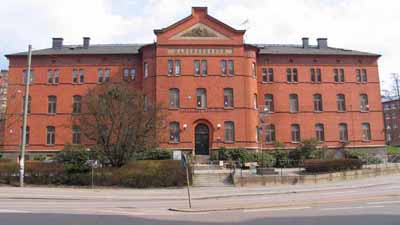 Several South Asia related departments and centres for regional studies
at Göteborg University will move location in late August 2005, and
be jointly administered within the framework of the new School of Global
Studies at Göteborg University (SGSGU). It is part of an effort to
coordinate global studies across disciplinary and regional limitations.
The South Asia related departments/centres moving are: The Dept.
of Peace and Development Studies, PADRIGU; the Dept.
of Social Anthropology; the Centre for Asian
Studies, CEAS; the Centre for Global Gender
Studies; the Centre for Middle Eastern Studies;
and the Section of Human Ecology. They will
move to what is to become known as ”Campus Linné”,
in three imposing old buildings, namely Annedalseminariet (Övre Husargatan
34), KK 2 (Konstepedimins väg 2, photo to the right), and
Rektorsvillan (Seminariegatan 1). More
information on the School of Global Studies at Göteborg University.
Several South Asia related departments and centres for regional studies
at Göteborg University will move location in late August 2005, and
be jointly administered within the framework of the new School of Global
Studies at Göteborg University (SGSGU). It is part of an effort to
coordinate global studies across disciplinary and regional limitations.
The South Asia related departments/centres moving are: The Dept.
of Peace and Development Studies, PADRIGU; the Dept.
of Social Anthropology; the Centre for Asian
Studies, CEAS; the Centre for Global Gender
Studies; the Centre for Middle Eastern Studies;
and the Section of Human Ecology. They will
move to what is to become known as ”Campus Linné”,
in three imposing old buildings, namely Annedalseminariet (Övre Husargatan
34), KK 2 (Konstepedimins väg 2, photo to the right), and
Rektorsvillan (Seminariegatan 1). More
information on the School of Global Studies at Göteborg University.
• Positions available at the University
of Toronto at Mississauga
The Department of Historical Studies at the University of Toronto
at Mississauga invites applications for three positions: A tenure-stream
Assistant Professor position in the History of Islam; an Assistant/Associate
Professor position in Buddhism; and an Assistant/Associate Professor
position in South Asian Religions. The selected candidates will be expected
to contribute to a new undergraduate program in the History of Religions
on the Mississauga Campus and to growing research-intensive doctoral
programs in the Graduate Department and Centre for the Study of Religion
and/or the Department of History on the St. George Campus of the University
of Toronto. Deadline for applications to all three positions is 15 September
2005. The appointment will begin 1 July 2006; an appropriate doctoral
degree must have been earned by that date.
• Doctoral and post-doctoral scholarships
announced at the University of Halle
Five doctoral and two post-doctoral scholarships are available
at the Section of Asian and African Studies, Martin Luther University
of Halle, Germany. Those working in the field of (postclassical) South
Asian studies are also eligible to apply. Since the doctoral scholarships
come with the requirement of supervision through the representative of
the respective discipline in Halle. Applications before June 30th 2005.
• Report from the 2005 Nordic Association for South Asian
Studies conference in Aarhus
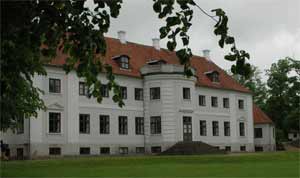 After
a gap of four years the Nordic Association for South Asian Studies, NASA,
successfully arranged a conference 3–5 June 2005 in Aarhus, Denmark.
Nearly 50 people met up for the conference, that had the theme ”Contemporary
Dramas of South Asia: Economic, Social, Political and Cultural Changes/Upheavals”.
It was organised by the Department
of Anthropology and Ethnography at the University of Aarhus (main
convenor: Dr. Lars Kjaerholm). Look
at photos from the conference, shot by Lars Eklund, SASNET.
After
a gap of four years the Nordic Association for South Asian Studies, NASA,
successfully arranged a conference 3–5 June 2005 in Aarhus, Denmark.
Nearly 50 people met up for the conference, that had the theme ”Contemporary
Dramas of South Asia: Economic, Social, Political and Cultural Changes/Upheavals”.
It was organised by the Department
of Anthropology and Ethnography at the University of Aarhus (main
convenor: Dr. Lars Kjaerholm). Look
at photos from the conference, shot by Lars Eklund, SASNET.
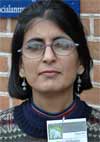 |
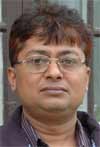 |
After some amalgamation the conference covered five workshops: 1. Globalization,
economic changes and socio-political upheavals + A South Asian security
conundrum? (convenors: Jørgen Dige Pedersen,
University of Aarhus, and Sten Widmalm, Uppsala
University). 2. States and minorities in South Asia. + Anti-oppressive
movements (convenors: Peter B Andersen, Copenhagen
University, and Aase Mygind Madsen, Århus).
3. Secularism in South Asia + Imagining Nations: middle classes and processes
of nation formation in South Asia (convenors: Erik
Sand, Copenhagen University, and Lars Kjærholm. Aarhus University.
4. Health, Globalization and Marginalization in South Asia (convenor:
Jens Seeberg. Aarhus University). Two Indian
participants in this panel, Renu Addlakha and Pramod Shankpal (photos
above) were funded for by SASNET. 5. Exploring South Asian political
culture(convenors: Arild Engelsen Ruud and
Pamela Price, Oslo University).
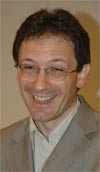 The
conference had four keynote speakers: Professor Zoya Hasan, Centre for
Political Studies, Jawarharlal Nehru University, New Delhi, lectured on
”The Struggle for Democratic Representation by marginalised
groups (OBC’s, women, minorities) in India”, Dr. Christophe
Jaffrelot, director of the Centre d’Etudes et Recherches Internationales
(CERI), Paris (photo to the right), lectured on ”BJP/Sangh
Parivar and the electoral defeat in 2004”; Professor Martin
Sökefeld, Dept. of Anthropology, Hamburg University, lectured on
”Continuing struggles, enduring drama: Kashmir and the construction
of nations in South Asia”; and finally Professor Isabelle Clark-Deces,
Department of Anthropology, Princeton University, lectured on ”The
Encounter never stops: Revisiting Caste, Hierarchy and Dominance in a
Tamil Village”. Venue for the conference was Moesgård
Museum (the Manor House of Moesgård) in the picturesque forest area
south of Århus. More
information on the NASA conference.
The
conference had four keynote speakers: Professor Zoya Hasan, Centre for
Political Studies, Jawarharlal Nehru University, New Delhi, lectured on
”The Struggle for Democratic Representation by marginalised
groups (OBC’s, women, minorities) in India”, Dr. Christophe
Jaffrelot, director of the Centre d’Etudes et Recherches Internationales
(CERI), Paris (photo to the right), lectured on ”BJP/Sangh
Parivar and the electoral defeat in 2004”; Professor Martin
Sökefeld, Dept. of Anthropology, Hamburg University, lectured on
”Continuing struggles, enduring drama: Kashmir and the construction
of nations in South Asia”; and finally Professor Isabelle Clark-Deces,
Department of Anthropology, Princeton University, lectured on ”The
Encounter never stops: Revisiting Caste, Hierarchy and Dominance in a
Tamil Village”. Venue for the conference was Moesgård
Museum (the Manor House of Moesgård) in the picturesque forest area
south of Århus. More
information on the NASA conference.
• Rules on how ro secure conference
and student visas to India
In order to secure a proper Indian visa foreign visitors to
academic conferences in India must submit a letter from the Swedish
University giving his/her credentials and a letter of invitation from
the conference organizers/university in India. Similarly Swedish students
visiting India for academic purposes should submit similar letters from
the Swedish and Indian Universities involved. If a group of students are
travelling together to India, they must apply together and send their
applications, passports etc. to the Embassy in one bunch.
In either of the above cases, it would be incorrect to apply for a tourist
visa, as it is against the regulations of the Government of India to use
a tourist visa for any other purpose. More
information including application forms are available at the web site
of the Indian Embassy in Stockholm.
• Uppsala University’s Master’s
Programme in South Asian Studies makes a halt
Uppsala University’s 60 credits (90 ECTS credits) interdisciplinary
Master’s Programme in South Asian Studies – Cultural Pluralism,
Political Institutions and Socio-economic Processes will not run in the
academic year 2005-06. The three semesters programme, bringing together
the disciplines of Indology, Political Science, History, Religion, Cultural
Anthropology and Ethnology, Economics, and Peace and Conflict Research,
was planned to start with a new programme in September 2005, but a decision
has been taken to make a one-year break. Instead a revised Masters programme
will preliminary start in September 2006. Contact person: Prof. William
Smith, Department of Linguistics and Philology, South
Asian Languages and Culture division.
• European Association of South Asian
Archaeologists holds conference in London
The European Association of South Asian Archaeologists holds
its biannual International Conference in London, UK, 4–8 July 2005.
The conference will be hosted by the Institute of Archaeology at the University
College London, and be held at the The British Museum (n the Clore Centre).
Papers on all aspects of South Asian archaeology will be presented, from
prehistory to art history, including studies of architecture and material
culture. The panels include one on ”The Cultural Diversity of
Northwestern South Asia at the time of the Indus Civilization”,
one on ”Issues in Indian Ocean Commerce and the Archaeology
of South India” and another on ”Indian Palace Architecture
of the 18th and 19th Centuries”. More
information.
• Stockholm venue for the 37th World
Sociology Congress
The 37th World Congress of the International Institute of Sociology
will be held in Stockholm 5–9 July 2005. The Congress allows social
scientists from different parts of the world to exchange ideas and to
establish long-term collaborative relationships. Its plenary and semi-
plenary sessions will focus on the ”Frontiers of Sociology”.
Prof. T.K. Oommen, Jawaharlal Nehru University, New Delhi, India, is one
of the convenors for the semi-plenary session on ”Multiple Modernities
and Social Theory”. There will also be up to 160 regular sessions,
in which up to 800 different papers will be presented. Several panels
focus on South Asian issues. Venue: Stockholm Conference Centre, Norra
Latin, Drottninggatan 71 B. More
information.
The Indian Institute For Sustainable Development And Research (ISDR) organizes
one of the sessions at the 37th World Congress of the International Institute
of Sociology in Stockholm. It is a session called ”New Partnership
Between European and Asian Institutes for Socio-Economic-Environmental
Development and Management”, and aims to explore the nature,
role and relevance of the urban development and its impacts both in theory
and in practice in South Asia and in the EU region and to highlight approaches
and methods for improving local environment. For more information contact
the session convenor, Dr. Anand Govind
Bhole.
• Heidelberg seminar on South Indian
history of religion
Arbeitskreises ”Moderne südindische Religionsgeschichte”
holds its second seminar meeting at the University of Heidelberg, Germany,
8–9 July 2005. The seminar is organised by Dr. Michael Bergunder,
Professor für Religionsgeschichte und Missionswissenschaft. Venue:
Seminarraum, Dekanat der Theologischen Fakultät Heidelberg.
• Rotterdam conference on the South
Asian Diaspora
A conference on ”The South Asian Diaspora. The Creation
of Unfinished Identities in the Modern World” is held at Rotterdam,
Netherlands, 23–24 July 2005. Venue: Erasmus University, Burgermeester
Oudlaan 50, Rotterdam. More
information.
• South Asia related papers at Finnish
conference on religion
The Finnish Society for the Study of Religion and the Donner
Institute are jointly organising a conference entitled “Exercising
Power: The Role of Religions in Concord and Conflict”, 17–19
August 2005. The conference is sponsored by the European Association
for the Study of Religions, EASR. Some South Asia related papers are
presented. Prof. Gudmar Aneer, Dept. of Religion,
Dalarna University, Falun, on ”Is There Such a Thing as
a Religious Policy? The Role of Religion in the Policy of Akbar the
Great Mogul”;
Dr. Dagmar Hellmann-Rajanayagam, Ludwig-Maximilians-Universität,
München, Germany, on ”Heroes and Martyrs: An Ambivalent
concept in ambivalent conflicts”, and Dr. Måns Broo,
Åbo Akademi, on ”Rhetorics of Violence in the Texts of
Bhaktivedanta Swami”. Venue: Linnasmäki Conference Center,
Turku (Åbo).
• Sunita Narain receives award at the
2005 World Water Week in Stockholm
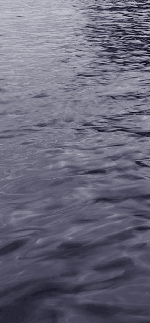 The
2005 World Water Week will take place in Stockholm, Sweden, 21–27
August. The annual World Water Week in Stockholm has become a valuable
meeting point and platform for the world’s water community, and
includes topical plenary sessions and panel debates, scientific Stockholm
Water Symposium workshops, seminars and side events organised by different
international organisations, exhibitions and festive prize ceremonies
honouring excellence in the water field. Usually a large number of the
delegates come from South Asia. The overall theme for the 2005 World Water
Week is “Drainage Basin Management. Hard and Soft Solutions in Regional
Development.” More information on the
World Water Week web site.
The
2005 World Water Week will take place in Stockholm, Sweden, 21–27
August. The annual World Water Week in Stockholm has become a valuable
meeting point and platform for the world’s water community, and
includes topical plenary sessions and panel debates, scientific Stockholm
Water Symposium workshops, seminars and side events organised by different
international organisations, exhibitions and festive prize ceremonies
honouring excellence in the water field. Usually a large number of the
delegates come from South Asia. The overall theme for the 2005 World Water
Week is “Drainage Basin Management. Hard and Soft Solutions in Regional
Development.” More information on the
World Water Week web site.
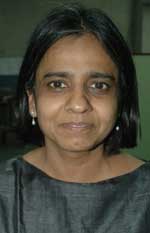 The
Centre for Science and Environment
(CSE) based in New Delhi, India, led by Ms. Sunita Narain, will receive
the 2005 Stockholm Water Prize. The award has been given by the Stockholm
International Water Institute (SIWI) to CSE for its efforts to build a
new paradigm of water management, which uses the traditional wisdom of
rainwater harvesting and advocates the role of communities in managing
their local water systems. Sunita Narain herself (photo to the left)
is a dynamic advocate for water, environment, human rights, democracy
and health, and has previously served as a member of the board for the
Stockholm Environment Institute (SEI). CSE
will receive the $150,000 Prize from HM King Carl XVI Gustaf of Sweden
during the Stockholm Water Week. More
information.
The
Centre for Science and Environment
(CSE) based in New Delhi, India, led by Ms. Sunita Narain, will receive
the 2005 Stockholm Water Prize. The award has been given by the Stockholm
International Water Institute (SIWI) to CSE for its efforts to build a
new paradigm of water management, which uses the traditional wisdom of
rainwater harvesting and advocates the role of communities in managing
their local water systems. Sunita Narain herself (photo to the left)
is a dynamic advocate for water, environment, human rights, democracy
and health, and has previously served as a member of the board for the
Stockholm Environment Institute (SEI). CSE
will receive the $150,000 Prize from HM King Carl XVI Gustaf of Sweden
during the Stockholm Water Week. More
information.
• Stockholm conference on pluralism
in Balochistan
The 3rd international conference on Balochistan with the theme
”Pluralism in Balochistan” will be held in Uppsala 18–21
August 2005. Balochistan has throughout history been one of the important
meeting points between the Indian Subcontinent and the Iranian Plateau.
Today's Balochistan is divided between Iran, Afghanistan and Pakistan,
and the conference wants to highlight various aspects of plurality in
present day Balochistan. Researchers are invited to present papers with
a focus on socioeconomic, religious, linguistic, literary and cultural
plurality in Balochistan. The conference is organised by the Iranian
Studies division at the Department of Linguistics and Philology, Uppsala
University. More
information (as a pdf-file)
• Kabul International Symposium on Global
Drug Policy
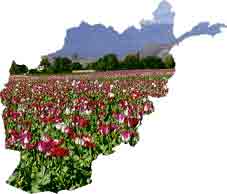 The
Senlis Council organizes a Kabul International Symposium on Global Drug
Policy in September 2005 (exact dates still to decide upon). Drug policy
experts from all over the world will meet with Afghan government officials
at both the national and provincial level along with other key stakeholders
and international organisations present in Afghanistan. The conference
will touch upon the issues of drug addiction and treatment, cultivation,
eradication and alternative livelihoods and organized crime and legal
responses. The Senlis Council was established in 2002 as an international
drug policy think tank which gathers expertise and facilitates new initiatives
on global drug policy. The Council convenes politicians, high profile
academics, independent experts and Non Governmental Organisations. More
information.
The
Senlis Council organizes a Kabul International Symposium on Global Drug
Policy in September 2005 (exact dates still to decide upon). Drug policy
experts from all over the world will meet with Afghan government officials
at both the national and provincial level along with other key stakeholders
and international organisations present in Afghanistan. The conference
will touch upon the issues of drug addiction and treatment, cultivation,
eradication and alternative livelihoods and organized crime and legal
responses. The Senlis Council was established in 2002 as an international
drug policy think tank which gathers expertise and facilitates new initiatives
on global drug policy. The Council convenes politicians, high profile
academics, independent experts and Non Governmental Organisations. More
information.
• Bornholm Researcher training course
on Security and Development
A Researcher training course on ”Security and development:
Recent trends in social science” is held in Nexö at Bornholm,
Denmark, 26–28 October 2005. It is organized by the Danish Research
School of Anthropology and Ethnography at Aarhus University, the Graduate
School of International Development Studies at Roskilde University),
the Rehabilitation and Research Centre for Torture Victims, and the Danish
Institute for International Studies in Copenhagen. The aim of the seminar
is to discuss ways to study and analyze the development security nexus.
Among the invited speakers are Dr. Veena Das from Johns Hopkins University,
USA. Deadline for application: 19 August 2005.
• New Delhi conference on Groundwater
for sustainable development
An International conference on ”Groundwater for sustainable
development. Problems, Perspectives and Challenges” is held in New
Delhi, India, 1–4 February 2006. The so-called IGC 2006 conference
is organised by the Indian National Geophysical Research Institute, Hyderabad;
the School of Environmental Sciences, Jawaharlal Nehru University, New
Delhi; Indian Institute of Technology-Delhi; and the International Groundwater
Arsenic Research Group at the Royal Institute of Technology (KTH), Sweden.
The goal of the conference is to provide a platform bringing together
earth scientists, professionals from chemical and engineering science
disciplines, public health professionals and social scientists involved
with the sustainable development of groundwater resources. Deadline for
abstract submissions: 30 June 2005. More
information.
• Association of Asian Studies invites
for South Asia related panels
The Association of Asian Studies in Ann Arbor, Michigan, USA,
invites for its next Annual Meeting, 6–9 April 2006. Participation
is now invited also from scholars based in South Asian universities
and research institutes, to two panels sponsored by the AAS South Asia
Council (SAC). The theme for these two panels will be ”Minority
Cultures and the Meaning of Citizenship in the Himalayas”, and ”The
Methodology of Gender in South Asia.” Paper proposals should
be delivered before 15 July 2005.
 •
19th European Conference of Modern South Asian Studies to be held in Leiden
•
19th European Conference of Modern South Asian Studies to be held in Leiden
The 19th European Conference of Modern South Asian Studies (ECMSAS)
will be held at Leiden University, the Netherlands, 27–30 June 2006.
The conference is hosted by the International Institute for Asian Studies
and Prof. D.H.A. Kolff will act as convenor. Panel proposals should be
submitted to the Conference Secretariat before 1 June 2005. An Academic
Advisory Committee now reviews the proposals. Notices of acceptance will
be sent out by August 2005. The accepted panel proposals will be listed
in the IIAS Newsletter and on the conference website. More
information.
• Other conferences connected to South Asian
studies arranged all over the World
See SASNET’s page, http://www.sasnet.lu.se/conferences.html#conf
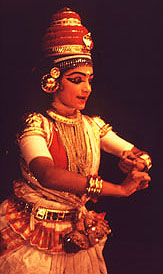 •
Kutiyattam dance troupe performs in Hälsingland
•
Kutiyattam dance troupe performs in Hälsingland
A Kutiyattam dance troupe from the Natana Kairali Research and
Performing Centre for Traditional Arts in Irinjalakuda, Thrissur District,
Kerala, India, visits Sweden during the summer 2005. The troupe led by
Gopal Venu has been invited by Gävle Theatre Association, involved
in a theatre exchange programme with India since 1999 (within the framework
of Världsteaterprojektet). They will give four performances of the
ancient Sanskrit drama Sakuntala in the Wooden Theatre of Järvsö
in Hälsingland, on Saturday 2 July, Sunday 3 July, Wednesday 6 July
and Thursday 7 July. Besides the public performances the Kutiyattam troupe
will also hold several workshops together with the actors belonging to
Folkteatern in Gävle. More
information.
• Full-day seminar on Indian culture
arranged in Stockholm
A full-day seminar on Indian culture in Sweden was arranged
in Stockholm on Saturday 4 June 2005, 10.00–17.30. The seminar,
called ”Att lära känna den svensk-indiska minoriteten”,
was jointly organised by ABF Stockholom, Det Stora Knytkalaset, Indian
Association and Integrationsforum, and included lectures by Professor
Bengt Häger on the Indian dancer Lilavati, professor Charles Westin
on the integration of the Asian refugees coming from Uganda to Sweden
in 1971, and the researcher Sheila Ghose on the importance of popular
gender forms in Indian diaspora literature. More
information (as a pdf-file).
New and updated items on SASNET web site
• More Swedish departments where research
on South Asia is going on:
Added to the list of research environments at Swedish universities,
presented by SASNET. The full list now includes 153 departments. Go
to the presentation page.
ƒ Telecommunication Systems Laboratory (TSLab), KTH School of ICT, Campus IT University in Kista (joint venture between the Royal Institute of Technology, KTH, and Stockholm University)
ƒ Paediatric Endocrinology Unit, Department of Woman and Child Health, Karolinska Institutet Medical University, Stockholm
ƒ Division for Reproductive and Perinatal Health, Department of Woman and Child Health, Karolinska Institutet Medical University, Stockholm
ƒ Division of Social Medicine, Department of Public Health Sciences, Karolinska Institutet Medical University, Stockholm
Have a nice Summer 2005,
Staffan Lindberg Lars Eklund
SASNET/ Swedish South Asian Studies Network
SASNET is a national network
for research, education, and information about South Asia, based at Lund
University. The aim is to encourage and promote an open and dynamic networking
process, in which Swedish researchers co-operate with researchers in South
Asia and globally.
The network is open to all sciences. Priority is given to co-operation
between disciplines and across faculties, as well as institutions in the
Nordic countries and in South Asia. The basic idea is that South Asian
studies will be most fruitfully pursued in co-operation between researchers,
working in different institutions with a solid base in their mother disciplines.
The network is financed by Sida (Swedish
International Development Cooperation Agency) and by Lund
University.
Postal address: SASNET – Swedish South Asian Studies Network, Scheelevägen 15 D, S-223 63 Lund, Sweden
Visiting address: Ideon Research Park, House Alfa 1 (first floor, room no. 2042), in the premises of the Centre for East and South East Asian Studies at Lund University (ACE).
Phone: + 46 46 222 73 40
Fax: + 46 46 222 30 41
E-mail: sasnet@sasnet.lu.se
Web site: http://www.sasnet.lu.se
Staff: Staffan Lindberg, director/co-ordinator & Lars Eklund, webmaster/deputy director
SASNET - Swedish South Asian Studies Network/Lund
University
Address: Scheelevägen 15 D, SE-223 70 Lund, Sweden
Phone: +46 46 222 73 40
Webmaster: Lars Eklund
Last updated
2010-06-03